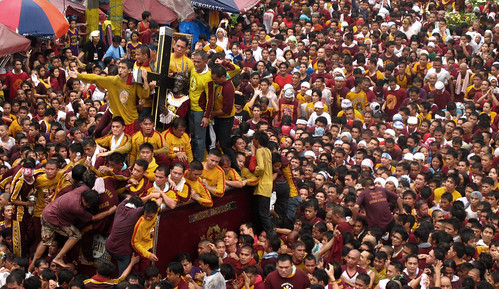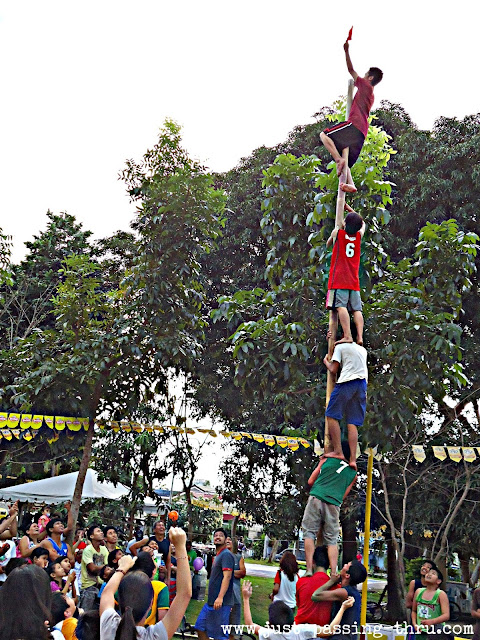Fiesta in the Philippines
12:19 PMFiesta in the Philippines is held in honor of a patron saint. In the Filipino culture, every city or town has at least one major festive celebration tied up with a religious observance. It is to be noted that the chosen date traditionally falls on the feast day of the patron saint which is determined by the Church based on the date of death of the saint.
Historical Basis of Fiestas
Philippine fiestas have been known to have been celebrated since the 1500's during the time of the Spanish conquistadors They have been observed mainly as a way to placate or please the gods. Specific rituals are done including sacrifices, merry feasting, and praying in anticipation of special blessings from heaven.
The fiestas observed today traces its origins from Roman Catholic Church-instituted celebrations in honor of Jesus, Mary, and various saints. Conducting fiestas was one of the ways used by Spanish conquerors to spread Christianity. It has always been designed to be a crowd-drawer from the activities, the colors, the presentations , and the highly festive mood.
Philippine Fiestas as Tourist Attractions
After successfully establishing itself as an integral part of Philippine culture and psyche, Philippine fiestas have likewise managed to be a core attraction in the eyes of foreign travelers. The Philippine Tourism's famous slogan "It's more fun in the Philippines" couldn't have been more descriptive of what goes on in Philippine fiesta celebrations.
In spite of the clear fact that Philippine fiestas were highly influenced by Roman Catholicism and Spanish ways, there are certain rituals and movements that obviously derived inspiration from Pre-Hispanic or pagan practices. The merging of origin and influence only served to add color and attraction that is difficult to resist. Any time of the year, there are bound to be fiestas happening all over the country but the more popular ones have become part of travel itineraries commonly offered by agencies.
Popular Religious-Based Philippine Fiestas
Feast of the Black Nazarene

Image: theologasia.ph
Date: January 9
Place: Quiapo, Manila
In honor of: Jesus Christ as the Black Nazarene
Characterized by: procession participated in by millions of usually barefooted devotees
Sinulog Festival
Image: flickr.com
Date: Third week of January
Place: Cebu City
In honor of: Child Jesus as Santo Nino
Characterized by: processions and street dancing and is often referred to as the local version of Mardi Gras
Ati-Atihan Festival
Image: flickr.com
Date: January 16-22
Place: Kalibo, Aklan
In honor of: Child Jesus as Santo Nino
Characterized by: blackened revelers dancing to a rhythmic beat while shouting "Hala Bira"
Moriones Festival
Image: flickr.com
Date: during Holy Week
Place: Boac, Marinduque
Based on : the story of Longinus whose blind eye was cured by a drop of Jesus' blood
Characterized by: actors dressed as Roman soldiers and wearing colorful wooden masks reenacting the story through a play
Manaoag Fiesta
Image: bestphilippineattractions.com
Date: 2nd week of April
Place: Manaoag, Pangasinan
In honor of: Nuestra Senora de Manaoag, Patroness of the sick, needy and the helpless
Characterized by: Holy pilgrimage of devotees and people hoping for a miracle
Carabao Festival

Image: townhall.com
Date: May 14
Place: Pulilan, Bulacan
In honor of: San Isidro de Labrador, patron saint of farmers
Characterized by: festively adorned carabaos
Pahiyas Festival
Image: flickr.com
Date: May 15
Place: Lucban, Quezon
In honor of: San Isidro de Labrador
Characterized by: brightly-colored rice wafers (kiping) decorating houses
Image: flickr.com
Date: 3rd Saturday of September
Place: Naga, Camarines Sur, Bicol
In honor of: Our lady of Penafrancia
Characterized by: fluvial parade carrying the image through the river aglow with candles
Higantes Festival
Image: flickr.com
Date: November 22 to 23
Place: Angono, Rizal
In honor of: San Clemente
Characterized by: parade of giant paper mache puppets
Other notable festivities include Flores de Mayo, Babaylan Festival, Obando Fertility Rites, Parada ng Lechon, Pintados Festival, Sandugo, Kadayawan, Masskara Festival, Binirayan Festival, and the Giant Lantern Festival, among others.
My Say
As a Manilena who has no home province to speak of, I have always envied my friends who had a province to go home to where they celebrate special festivities with family and long-time friends. I can almost relate to their excitement in going home when I see videos and photos of festivities happening all over the country. That said, witnessing fiestas in the Philippines is one good reason to travel and discover our country.















0 comments
Let us know what you think